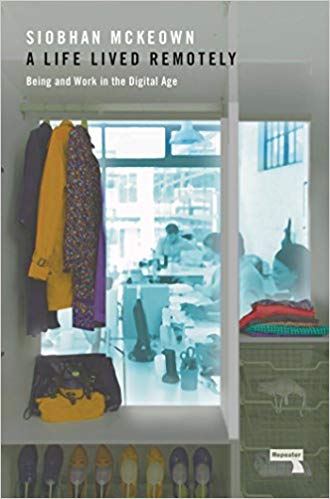
This article is a preview from the Summer 2018 edition of New Humanist
A Life Lived Remotely: Being and Work in the Digital Age (Repeater) by Siobhan McKeown
I read most of A Life Lived Remotely on lunch breaks in my house in Athens, Greece, sat on the dog’s sofa, occasionally stroking his belly. I’m a freelance journalist. Reading a book for review is technically work, but not really. So I used my “leisure hours”, sneaking in some crucial pet time.
Siobhan McKeown would understand a thing or two about this kind of guilty bargaining. A Life Lived Remotely catalogues her personal journey from bored office worker to remote employee, through stretches of stressed freelancing and a year as a backpacking “digital native”. It’s both a memoir and a reflection on technology and society. “When the outsourcing of our lives to the internet is complete,” she writes, “I want to remember how we got there.”
The memoir sections are deliciously relatable. We learn about her home-work uniform (pyjamas or band T-shirts); the bickering with her husband who is still punching clock; the series of productivity apps that are eventually replaced with a notepad and pen. According to the Office for National Statistics, more than four million people regularly worked from home in the UK in 2015. McKeown says global telecommuting more than doubled between 2004 and 2014. Increasingly a common experience, it is often cruelly isolating. A Life Lived Remotely is an honest account of the niggling issues and existential angst, the unpaid fees and unexplained email silences, that so often undercut the pleasures of so-called “freedom” from the office.
The more general reflections on work, however, can verge on the obvious. There are juicy quotes from some of the greats: Karl Marx, Philip Larkin, J. G. Ballard, Plato. But given that precarity is a big theme it’s strange that recent work isn’t explored more fully, such as by Guy Standing, who popularised the term “precariat”; or David Graeber, whose Bullshit Jobs: A Theory is due to be published in May. By the end of the book, McKeown is a mother. She is finally compelled, she says, to find a work-life balance around her baby. So it seems especially amiss not to apply the ideas of Silvia Federici and later feminist thinkers around caring as an unrecognised form of labour.
As McKeown points out, there is an insidious pressure on workers today to be both free and constantly productive, to “live our passion” but also to perform it. Her book is a welcome antidote to a spate of aspirational best-sellers like Mark Anastasi’s The Laptop Millionaire: How Anyone Can Escape the 9 to 5 and Make Money Online. Then again, this is not the first tell-all book to have taken a more candid approach to the pros and cons of telecommuting. In taking a generational approach, McKeown might have offered Gen Y strategies for overcoming the neoliberal working culture that is often facilitated by the internet. She gives us her own richly contextualised story, but not much more.
Finally, though, books like this can help build the kind of solidarity sorely needed in the new economy. The chapter “The Puritan Inside Me” has a wonderful description of a “bad day” of freelancing that takes up more than two pages. You can feel her squirming with guilt. It’s almost like a confessional. Sitting on the sofa on my lunch break, I can relate. Shouldn’t I get back to work? What will await me when I open my emails? Will the payment from my last project finally be in? We’re all trying to find our work-life balance. It’s crucial to know we’re not struggling alone.

